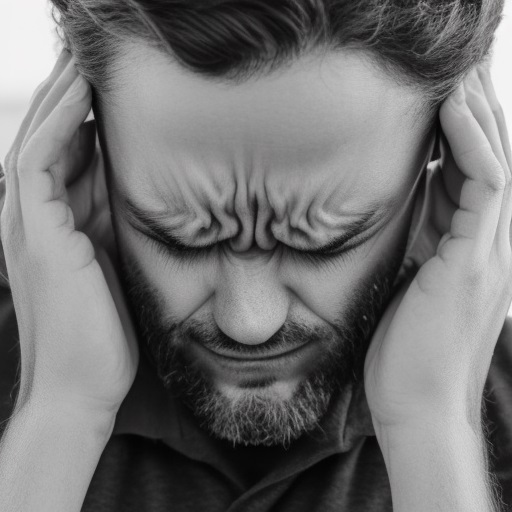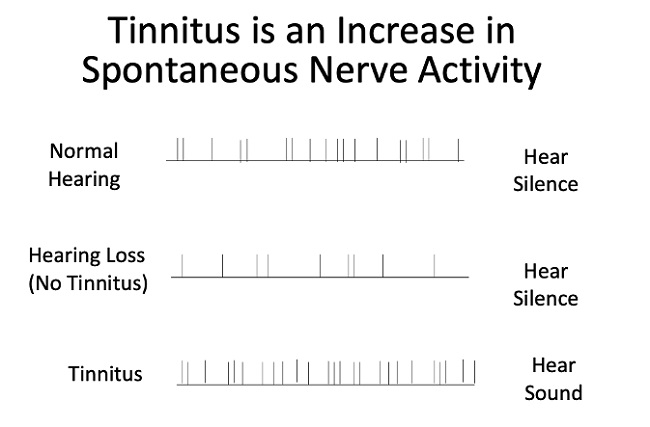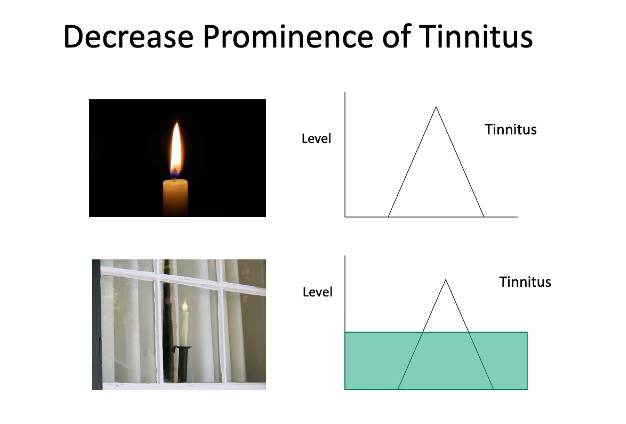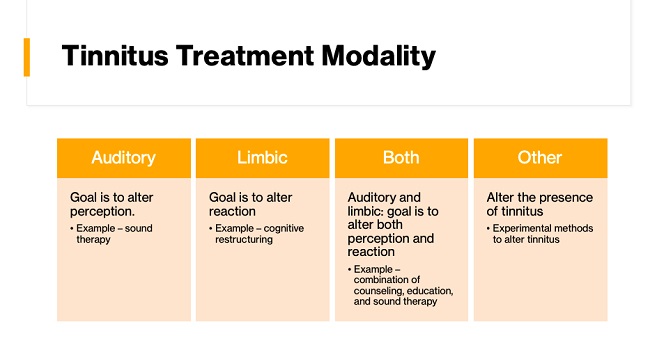Positive Health Online
Your Country

Tinnitus Management Strategies
listed in sound and music, originally published in issue 286 - May 2023
There are millions of Americans who experience tinnitus. If you're one of them, you know how frustrating and difficult the condition can be. Constant ringing, hissing, or buzzing in your ears can make it difficult to concentrate, sleep, or enjoy some peace. The good news is that several effective tinnitus management strategies can help lessen the symptoms and improve your quality of life. This article will go through valuable and effective strategies for tinnitus management.

Original Creation from Jasper Art
What is Tinnitus
Tinnitus sounds different for everyone. Some describe the sound as ringing, buzzing, humming, whistling, electrical powerline noise, or other sounds. Many patients report the perception of their tinnitus differently. Tinnitus can be constantly or intermittently present, and some find its presence benign, while others find it very bothersome. Currently, there is no cure for tinnitus. However, some proven tinnitus management strategies can help improve your quality of life.
Courtesy Dr Richard Tyler's tinnitus slides
https://medicine.uiowa.edu/oto/sites/medicine.uiowa.edu.oto/files/TAT%20summary%20Update%20v6_0.pdf
Trigger Elimination: Caffeine, Alcohol, Sodium
A good way to manage your tinnitus is to identify and eliminate potential triggers. Common triggers include caffeine, alcohol, and sodium. However, individual effects from these triggers can vary, and research is mixed on their effect.[1]. While no particular trigger worsens tinnitus in all patients, individual sensitivities may vary, and potential triggers are worth exploring.
Caffeine is a stimulant that can exacerbate tinnitus symptoms. So cutting back on coffee, tea, and energy drinks can help reduce this effect for caffeine-sensitive people. However, while everyone responds differently to caffeine, for some people, this is a trigger that can worsen tinnitus perception. So first, consider how much caffeine you consume each day. Then, try reducing caffeine intake and see how you do.
Proper hydration is essential; any food or drinks that affect hydration can provoke symptoms. For example, alcohol is a diuretic that can dehydrate your body and worsen tinnitus symptoms. And sodium can cause fluid retention, which can worsen tinnitus symptoms. Eliminating or reducing your alcohol or sodium intake can help lessen your symptoms and is worth a try.
Self-Care and Wellness
Another critical aspect of tinnitus management is self-care. Stress worsens tinnitus and finding ways to manage stress can enormously impact your overall well-being. When you care for your mental and physical health, you'll reduce stress and anxiety and help reduce tinnitus symptoms as a result. Good self-care means setting time aside to reflect on your day and tend to your needs.
To ensure good self-care, find time in your day to take breaks, move away from your desk during your lunch break, and find time for things you enjoy. Many of us experience high-stress levels due to work-related stress and pressures. Regular exercise, eating a healthy diet, getting enough sleep, and practicing relaxation techniques can all help reduce stress and improve your overall well-being.
Patients find activities such as progressive muscle relaxation, yoga, or Tai Chi help to manage stress. Additionally, studies show that yoga is helpful as a support strategy in tinnitus management.[2] A 12-week yoga course resulted in changes observable in an MRI scan, demonstrating the positive impact of a consistent yoga practice. Participants in the study noted improvement in sleep, quality of life, and tinnitus perception. Incorporating a yoga practice is a great way to manage tinnitus symptoms.
Sleep Hygiene
Getting enough restful sleep is crucial for managing tinnitus (and almost everything else in life!). You can do several things to promote better sleep hygiene, and making these changes can significantly impact your overall health. Helpful strategies to improve sleep include:
- Establishing a regular sleep schedule,
- Avoiding caffeine late in the day,
- Disconnecting from electronic screens at least an hour before bedtime,
- And creating a relaxing bedtime routine.
Sleep quality impacts how stressed you feel, which can also affect tinnitus perception. Establishing a routine each night goes a long way to helping you get restful sleep each night.
Courtesy Dr Richard Tyler's tinnitus slides
https://medicine.uiowa.edu/oto/sites/medicine.uiowa.edu.oto/files/TAT%20summary%20Update%20v6_0.pdf
Masking Noise
Another effective tinnitus management strategy is masking noise. You can use several types of background noise to camouflage the sound in your ears. For example, some find white noise or other colors of noise, such as pink or brown, to be soothing. The type of noise you prefer may depend on several variables: the sound quality of your tinnitus, your environment, and your preference. For example, white noise effectively covers most background noise and can mask tinnitus well for many people. However, brown noise may be more effective at masking tinnitus with a lower frequency.
Additionally, some patients prefer listening to natural sounds instead of noise. While there are many options, most patients find water sounds particularly soothing, such as waterfalls or ocean waves. You can experiment with different nature sounds and see what you like best and find most relaxing. The most crucial point with masking noise is that it comfortably covers the tinnitus sound.
Hearing Aids
The majority of individuals with tinnitus have some degree of hearing loss. If you suffer from hearing loss as well as tinnitus, hearing aids can be an effective way to treat both conditions simultaneously. Hearing aids amplify sounds to compensate for hearing loss, which can help lessen the perception of tinnitus symptoms. As the brain adjusts to the sound of the hearing aids, patients often find that their tinnitus perception diminishes.
In addition, many modern hearing aids come equipped with tinnitus masking features. While wearing hearing aids alone can sometimes improve tinnitus perception, another option includes tinnitus masking programs on the hearing aids themselves. A tinnitus program can be set to any sound you prefer to hear to mask your tinnitus, and an audiologist will set this at the appropriate level for you.
Courtesy Dr Richard Tyler's tinnitus slides
https://medicine.uiowa.edu/oto/sites/medicine.uiowa.edu.oto/files/TAT%20summary%20Update%20v6_0.pdf
Treatment
Several types of treatment target the sound itself or the emotions that accompany tinnitus. These options include auditory, limbic, or both types of treatment. Depending on patient needs, a combination of approaches can sometimes have the best effect.
Sound Therapy
Sound therapy is one treatment option for managing tinnitus symptoms. This therapy uses sound to change how your brain perceives the ringing, buzzing, humming, or other noise in your ears. Sound therapy aims to change the auditory perception of tinnitus.
Limbic Treatment Approach
For many individuals with bothersome tinnitus, the limbic treatment approach targets the emotions that accompany tinnitus perception. Most commonly, the negative emotions accompanying tinnitus make it most disruptive. Therefore, a treatment that targets and explores these emotions can help provide relief. Options for this type of treatment include cognitive behavioral therapy (CBT) or cognitive restructuring.
Tinnitus Activities Treatment
The Tinnitus Activities Treatment approach incorporates both auditory and limbic treatment to improve the tinnitus sound and the reactions accompanying it. This method examines the way you experience the tinnitus sound. It enhances well-being by addressing the auditory perception of the tinnitus, stress management, sleep hygiene, and emotions accompanying the tinnitus sound. Patients find this holistic approach very beneficial.
Alternative Therapies
In recent years, a company called Neuromod has created a promising device to help cope with tinnitus. Their bimodal neuromodulation device delivers relief with promising initial results, showing over 80% improvement in tinnitus symptoms.[3] This tongue stimulation device shows promise for the future of tinnitus management.
Conclusion
If you're suffering from tinnitus, there's no need to despair – several effective management strategies can help improve your quality of life and lessen symptoms. Tinnitus has no cure, but there are effective methods to manage symptoms. For example, trigger elimination (caffeine, alcohol, sodium), self-care and wellness, sleep hygiene, masking noise with background sound, hearing aids, and sound therapy are proven to help you get relief from ringing in your ears. Talk to your doctor about which approach might be right for you.
References
- Biswas, R., Lugo, A., Genitsaridi, E., Trpchevska, N., Akeroyd, M. A., Cederroth, C. R., Liu, X., Schlee, W., Garavello, W., Gallus, S., & Hall, D. A. (2021). Modifiable lifestyle-related risk factors for tinnitus in the general population: An overview of smoking, alcohol, body mass index, and Caffeine Intake. Progress in Brain Research, 1–24. https://doi.org/10.1016/bs.pbr.2021.04.005
- Niedziałek, I., Raj-Koziak, D., Milner, R., Wolak, T., Ganc, M., Wójcik, J., Gos, E., Skarżyński, H., & Skarżyński, P. H. (2019). Effect of yoga training on the tinnitus induced distress. Complementary Therapies in Clinical Practice, 36, 7–11. https://doi.org/10.1016/j.ctcp.2019.04.003
- Conlon, B., Langguth, B., Hamilton, C., Hughes, S., Meade, E., Connor, C. O., Schecklmann, M., Hall, D. A., Vanneste, S., Leong, S. L., Subramaniam, T., D'Arcy, S., & Lim, H. H. (2020). Bimodal neuromodulation combining sound and tongue stimulation reduces tinnitus symptoms in a large randomized clinical study. Science Translational Medicine, 12(564). https://doi.org/10.1126/scitranslmed.abb2830
Comments:
-
No Article Comments available


